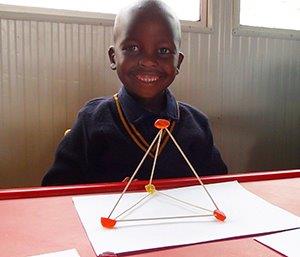
For Grade R learners at Nzame Primary, their
basic Geometry insight about shapes advanced
to engineering skills when they built modern pyramids,
connecting jelly sweets and sosatie sticks.
Photo: Supplied
Any phase in a learner’s life can be the right time to explore science. As for Grade R learners at Nzame Primary School in Mangaung, it all started when their Deputy Principal, Charles Busack, attended the Global University for Lifelong Learning (GULL) workshop coordinated by the university’s Community Engagement in October 2016. The GULL network enables its affiliated organisations to recognise the individual and collective efforts of those who are creating progressive transformation in communities and in the workplace. Consequently, a community-based initiative, Science4Fun, was developed and launched at the primary school, where learners would start to experiment with science through play.
University students instrumental in teaching
Every Tuesday morning, these fun science activities form part of the foundation phase programme, in which Dr Elizabeth Conradie of the Central University of Technology (CUT) and four postgraduate Science students from the UFS, engage teachers and learners in exciting experiments and demonstrations.
Most people just know pyramids as big, impressive structures built a long time ago in Ancient Egypt. However, for Grade R learners at Nzame Primary, their basic Geometry insight about shapes advanced to engineering skills when they built modern pyramids, connecting jelly sweets and sosatie sticks.
Laying a foundation for the future
According to Dr Conradie, more fun exercises are lined up for curious minds, exploring other sciences such as Chemistry and Mathematics, combined with music. The initiative will assist to equip learners with the basics of Science into more advance learning phases of the schooling years, giving them an advantage.